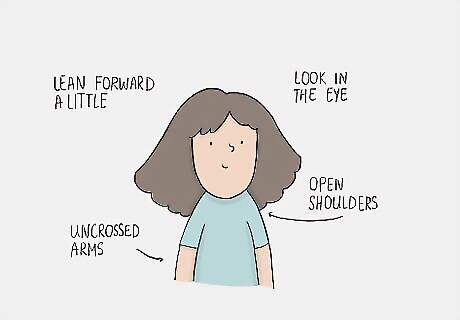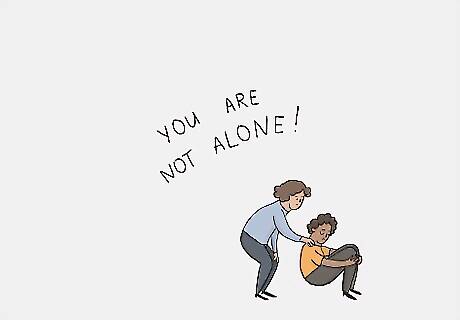
views
Having Friendly Conversations

Say hello when you see them. Nodding, smiling, and waving at your friends are all friendly gestures, but these don’t start conversations. Saying “hello” to a friend when you see them in the hall or around your neighborhood gives you the chance to start a friendly conversation. Follow up with them by sincerely asking them how they are doing. Even if you can’t talk for long, expressing a sincere interest demonstrates that you care about them as a friend.

Recall personal details in conversation. Think about things your friend told you in the past. Did their favorite band just release a new album? Were they just out of state visiting their parents? Recall these details and ask your friend about them to show that you hear them when they speak. For example, if your friend recently got back from traveling, try saying something like, “How was your vacation in Aruba? I want to hear all about it.”

Keep the conversation equal between speakers. It’s impolite to overpower a conversation, but it can be intimidating to ask someone else to do all the talking. Instead, try to keep things equal. After you make a point or ask a question, give your friend a chance to respond. Likewise, when they ask you something, try to give more than a one-word answer. If you don’t know about something, don’t be afraid to ask for clarification. If your friend asks you about a movie that you haven’t seen, for example, don’t just say, “I haven’t seen it.” Follow up with, “It looks interesting, though. Tell me more about it.”

Balance how much personal information you disclose. Try not to share too much too fast. Building a friendship is a slow process that needs to be based on mutual trust. Each time you talk, try to share a little bit more about yourself. For example, you don't want to dive right in with problems that you're having in your relationship. Start with less personal topics, and share more personal information as the friendship grows stronger. Balance what you share with what your friend is willing to share. If you really want to talk about personal secrets but they’re still only comfortable talking about their cat, respect that and wait to divulge your secret until you’ve built more trust. Likewise, if a friend is sharing more than you’re comfortable with, let them know, “I don’t know if I’m the right person to talk to about this.”

Keep an open, welcoming posture. Friendly communication is about more than just what you say. Keep your body language friendly by leaning forward a little, keeping your shoulders open, your arms uncrossed, and looking your friend directly in the eye. This lets them know you’re open and receptive to a conversation. Don’t lean forward so much that you’re violating your friend’s personal space. The intention is to lean forward a little bit to show your interest, not to lean forward so much that you make them uncomfortable.
Discussing Difficult Topics

Let your friend know that they’re not alone. You might not understand exactly what your friend is going through, but you can still let them know you’re there to support them. Reassure them that they’re not alone and that you’re there to listen and help them if they need it. It can sometimes be helpful to share a story about a time when you were emotionally struggling and asked for help. This lets your friend know that difficult times happen to everyone and that it’s okay to reach out.

Ask open-ended questions. Asking the right question will not only help you better understand what your friend is going through, it will help your friend get out their emotions. Try to keep questions open-ended to encourage your friend to talk about what they’re thinking and feeling rather than probing for details. Questions like, “How are you feeling right now?” give your friend more space to express their emotion than questions like, “Are you mad?”

Avoid judging them. It can take a lot of courage for your friend to reach out, especially if they’ve done something they’re not proud of. Try to listen to them without judgment. You don’t need to agree with what they’re saying or what they did, but remember that all people make mistakes. Listen, and understand that your friend has flaws just like every other person. Avoid placing blame for problems. If your friend cheated on a test, for example, don’t tell them they’re a bad student. Instead, say, “Math can be a tricky subject. Instead of cheating next time, though, why don’t we do our homework together so I can tutor you?”

Help them ask for help. If your friend needs help to get them through a difficult time, offer to help them reach out. It can be scary and isolating to ask for help on your own. Offer to go with them or help them research options. This lets them know they’re not alone, and that it’s okay to get help for hard times. For example, if your friend is struggling with depression, they might be afraid to talk to a therapist. Offer to look up a few therapists in their area that specialize in helping patients with depression.
Being a Good Listener

Support your friend if they say they don’t want to talk. If a friend who is frustrated or in pain says they don’t want to talk about their feelings right now, it can sting. You want to be a good friend and help them, and it feels like you can’t do that if they won’t open up. It may be difficult, but the best thing to do in these situations is to let your friends have their space. Let them know, “That’s all right. I’m not going to push you if you don’t want to talk. Just know that I am here for you if decide later that you need someone to listen to you.” There are a lot of reasons your friend may not be ready to talk. They may not be sure how they feel about a situation. They may be trying to move past it. They may not feel safe comfortable talking about the situation. Don’t take it personally. Just respect them.

Practice active listening. Active listening is a set of tools you can use to show your friend that you’re involved and engaged in what they are saying. It’s based on maintaining open body language, avoiding giving unsolicited judgment or advice, and expressing an active interest in what your friend says. Paraphrase your friend periodically as they speak. This lets them know that you are paying attention to what they are saying. Express empathy. Empathy is very important in active listening. If your friend has negative feelings, whether they are toward you or someone else, validate those feelings rather than questioning them. For example, if your friend is stressed by their job, listen to them until they’re done speaking. Then, paraphrase and show empathy by saying “What I hear is that you feel really stressed right now, and I understand how a workload like that can lead to stress.”

Avoid interrupting your friend. You may have questions when your friend is talking or they may have reminded you of your own story. Still, it’s important to avoid interrupting your friend while they’re talking. This lets them know that you respect what they have to say. If there’s something you really want to address but your friend is still talking, make a note to yourself. It could be a mental note, or you could write down a few words on a scrap of paper to help remind you of your points.



















Comments
0 comment